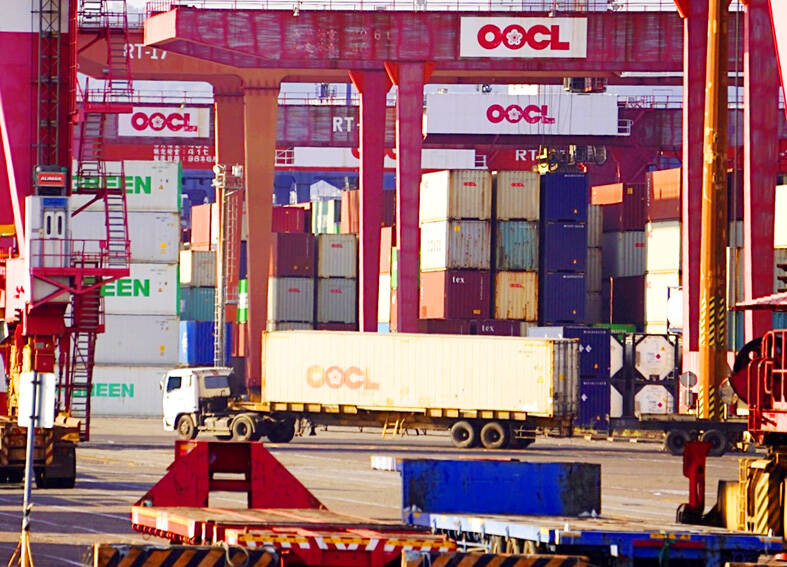Export orders last month fell more than expected, down 18.3 percent annually to US$42.12 billion, marking a sixth month of consecutive declines, the Ministry of Economic Affairs said yesterday.
On a monthly basis, export orders dropped 11.4 percent, the ministry said in a report.
The result missed the ministry’s earlier forecast of an annual drop of 6.9 to 10.8 percent to between US$46 billion and US$48 billion for the month.

Photo: CNA
The ministry attributed the sluggish performance to slowing end-market demand and continued inventory adjustments, while China’s recovery remains bumpy.
Last month’s disappointing figure brought combined export orders in the first two months of this year down 18.8 percent year-on-year to US$89.63 billion, ministry data showed.
The ministry forecast that export orders would drop this month by 20.2 to 23.4 percent annually to between US$48 billion and US$50 billion, as seasonal weakness continues to weigh on orders while macroeconomic conditions are reducing consumer spending.
As a result, first-quarter export orders are estimated to fall by between 19.3 and 20.5 percent from a year earlier to between US$137.6 billion and US$139.6 billion, it said.
The latest data showed export orders for information, communications and technology products last month shrank 20.3 percent, and other electronic goods dropped 21.9 percent, from a year earlier as increased shipments of smartphones, networking devices and servers were offset by slowing demand for chips, printed circuit boards and computer displays, the report said.
Optoelectronics products last month experienced a 38 percent annual contraction as flat panels and camera lenses continued to be affected by slowing customer demand and falling prices, it said.
The nation’s traditional sectors experienced the same downtrend as the tech sector, with orders for basic metals, machinery goods, plastics and chemical products last month shrinking from the same period last year by 21.5 percent, 16 percent, 22.8 percent and 26.9 percent respectively.
Orders from the US, China (including Hong Kong), Europe and Southeast Asia fell annually, with the Chinese market dropping the most by 35.5 percent, while Japan saw an increase of 5.5 percent from a year earlier, the report said.

To many, Tatu City on the outskirts of Nairobi looks like a success. The first city entirely built by a private company to be operational in east Africa, with about 25,000 people living and working there, it accounts for about two-thirds of all foreign investment in Kenya. Its low-tax status has attracted more than 100 businesses including Heineken, coffee brand Dormans, and the biggest call-center and cold-chain transport firms in the region. However, to some local politicians, Tatu City has looked more like a target for extortion. A parade of governors have demanded land worth millions of dollars in exchange

Hong Kong authorities ramped up sales of the local dollar as the greenback’s slide threatened the foreign-exchange peg. The Hong Kong Monetary Authority (HKMA) sold a record HK$60.5 billion (US$7.8 billion) of the city’s currency, according to an alert sent on its Bloomberg page yesterday in Asia, after it tested the upper end of its trading band. That added to the HK$56.1 billion of sales versus the greenback since Friday. The rapid intervention signals efforts from the city’s authorities to limit the local currency’s moves within its HK$7.75 to HK$7.85 per US dollar trading band. Heavy sales of the local dollar by

Taiwan Semiconductor Manufacturing Co’s (TSMC, 台積電) revenue jumped 48 percent last month, underscoring how electronics firms scrambled to acquire essential components before global tariffs took effect. The main chipmaker for Apple Inc and Nvidia Corp reported monthly sales of NT$349.6 billion (US$11.6 billion). That compares with the average analysts’ estimate for a 38 percent rise in second-quarter revenue. US President Donald Trump’s trade war is prompting economists to retool GDP forecasts worldwide, casting doubt over the outlook for everything from iPhone demand to computing and datacenter construction. However, TSMC — a barometer for global tech spending given its central role in the

An Indonesian animated movie is smashing regional box office records and could be set for wider success as it prepares to open beyond the Southeast Asian archipelago’s silver screens. Jumbo — a film based on the adventures of main character, Don, a large orphaned Indonesian boy facing bullying at school — last month became the highest-grossing Southeast Asian animated film, raking in more than US$8 million. Released at the end of March to coincide with the Eid holidays after the Islamic fasting month of Ramadan, the movie has hit 8 million ticket sales, the third-highest in Indonesian cinema history, Film